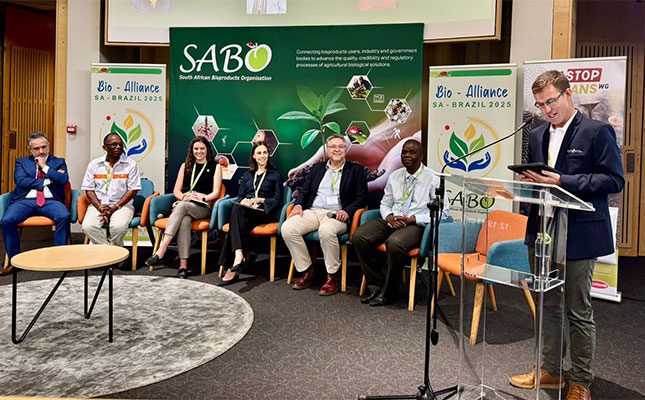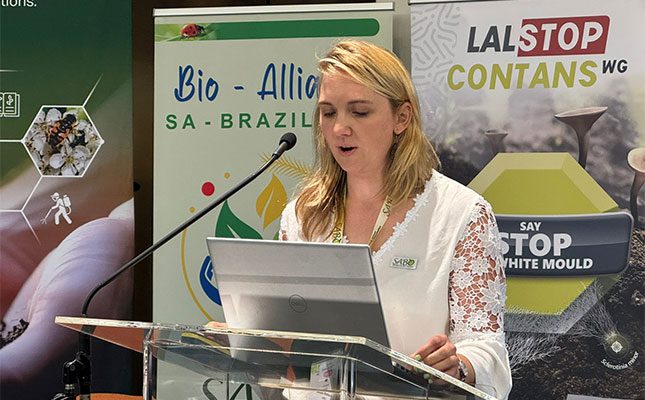
The Bio-Alliance SA-Brazil 2025 Conference aimed to unlock the value of bio-inputs through collaborative partnerships to promote more sustainable agricultural systems.
The South African Bioproduct Organisation (SABO) facilitated the conference. SABO is the representative body of the agricultural bioproduct industry and is the link between government and the bioproduct industry.
It represents the full value chain of stakeholders in the agricultural bioproduct industry, including researchers, manufacturers, wholesalers, distributors, users of bioproducts, grower organisations, and retailers.
According to Debbie Matteucci, SABO chairperson, as an industry body, SABO aims to grow the biological industry and promote research, development, and training.

SA-Brazil collaboration
In September, Agriculture Minister John Steenhuisen signed, on behalf of the South African Government, a Memorandum of Intent (MOI) with the Federative Republic of Brazil.
In a welcome message at the congress delivered on Steenhuisen’s behalf, Mooketsa Ramasodi, director-general of the Department of Agriculture, said the Bio-Alliance provides a platform for the two countries to extend collaboration, linking soil and seed to health and nutrition.
“[The Bio-Alliance] will help us bridge the disciplines of agriculture, medicine, and the environment, and position biotechnology as a driver of inclusive growth and sustainability,” he explained.
The MOI is a framework for cooperation that brings structure, direction, and renewed energy to the partnership between the two countries.
“The memorandum commits our two agriculture ministries to work jointly on sustainable production systems, sanitary and compliance inspection, and consumer safety, and to do so through technical exchanges, symposia, joint training, and collaborative research,” Ramasodi added.
The Bio-Alliance aims to build the bioindustry’s scientific and institutional capacity to enable it to confront shared challenges and strengthen biosecurity systems that protect human, plant, and animal health.
“It also aims to create knowledge networks that benefit both commercial and emerging farmers,” he said.
According to Benedicto Fonseca Filho, Brazil’s ambassador to South Africa, Brazil embraced the challenges the bioproduct industry brought to the agriculture sector in 2020. He added that Brazil looks forward to sharing its learnings and best practices with South Africa.
Filho stated that a proper bioproduct regulation system allows for innovation and offers a framework for the future development of the industry and integration into agricultural systems.
He pointed out that the use of bioproducts in Brazil has led to improvements in sustainability, productivity, profitability, as well as crop health and food safety.
“Brazil is ready to continue research and the promotion of bioproducts,” Filho added.
Insights on bio-inputs, sustainability, and market opportunities
In his opening remarks at the congress, Carlos Vitor Müller, Brazilian agricultural attaché in South Africa, said it is rewarding to talk about sustainability.
He explained that in Brazil’s Low-carbon Agriculture Plan, bio-inputs are part of an integrated sustainable approach followed by the Brazilian government.
“On the other hand, the National Bioinputs Program promotes innovation and the widespread use of bio-inputs nationwide. It supports the localisation of input production and farmer resilience. For us, it is an important way to bring food security to the country,” he explained.
Another aspect that is important to the Brazilian government is the localisation of the production of inputs, as they believe it will promote self-sufficiency, Müller added.
Looking at the global bioindustry market, he pointed out that in 2023, the biological market amounted to US$14 billion (around R262 billion), with an expected growth of 13% to 14% annually.
“Biological control products constitute 57% of the overall market. By 2032, it is estimated that the market will grow to around US$45 billion [R782 billion],” Müller said.
He mentioned that Brazil holds 11,35% of the global bio-inputs market and that 156 million hectares were treated with biological products in 2024. The value in rands amounts to R14,4 billion in revenue.
“We experienced a national market growth of 21% per annum for the past three years. From 2022 to 2024, in only two years, the overall market for traditional chemical remedies was reduced by 20%,” Müller added.
According to CropLife Brazil, the current market share by segment is:
- Bio-nematicides – 24%
- Inoculants – 19%
- Bio-insecticides – 35%
- Bio-fungicides – 22%
Müller stressed that the technology, innovation, and regulatory framework in Brazil reduces red tape and makes it easier to register new bioproducts. “Our comprehensive regulatory framework and bio-input laws support the adoption and use of the products. We simplified the registration process, and this is supporting sustainable agriculture.
“With regard to the registration of bioproducts, bio-insecticides constitute 45,67% of all registered products.”
He said opportunities exist for Brazil and South Africa to collaborate on research, technology transfer, and trade to advance the adoption of bio-inputs. “Mutual benefits lie in cooperation opportunities for fostering sustainable agriculture and stronger bioeconomy positions,” he stated.
South African insights
Giving a South African perspective, André Labuschagne, head of agronomy and strategy at Syngenta, referred to a survey SABO conducted among South African role players. He said AECI, InteliGro, Laeveld Agrochem, Nexus, Viking, and Wenkem SA reported the South African bioproducts market is valued at R18 billion.
“Bioinsecticides and biofungicides make up 44% of the biological market, while biostimulants, macrobials, and semiochemicals are seen as underdeveloped markets,” he added.
According to the survey, the percentage of distributors selling biological products for different crops is as follows:
- Deciduous fruit – less than 20%
- Barley – less than 20%
- Tree nuts – less than 40%
- Potatoes – less than 40%
- Berries – 50%
- Pome and stone fruit – 50%
- Wheat – 50%
- Soya bean – 50%
- Subtropical fruit – 50%
- Tomatoes – 70%
- Grapes (table and wine) – 100%
- Citrus – 100%
The survey indicated, however, that all distributors expect the market to grow.
Labuschagne said the adoption of biological crop protection is currently driven more by external pressures than by internal business benefits. “Growers are moving toward biologicals mainly to meet strict organic or low-residue regulations and environmental concerns,” he explained.
According to Michelle Lesur, CEO of Andermatt Madumbi, it is important to look at the drivers that facilitate the adoption of biological products. She highlighted the following reasons for adoption:
- Low-residue requirements, especially for the export market
- Environmental demands
- Consumer demands
She added that key barriers hindering adoption are:
- Inconsistent performance
- Perception that biological products are more expensive
- Lack of knowledge about integrated pest management (IPM)
- Limited awareness and training
- Efficacy issues
- Regulatory delays
- Production availability
- Access to export markets
- Distribution
Lesur said congress delegates should focus on the impact of collaboration on achieving sustainable, science-based bio-input solutions globally. She added that it is important to consider the future and how wider adoption of biological products can be facilitated.
According to her, some approaches include:
- Proof of performance
- Access to credible scientific data and technology, especially South African data
- More training and extension services
- Faster registration processes
- Stronger enforcement against unregistered products
She also mentioned that the industry needs a robust registration process and to increase education regarding biologicals and IPM strategies.
Regulatory framework needed for industry growth
“We are talking about science as the cornerstone of the innovations we want to drive as we celebrate the partnership between the two countries; a partnership that is rooted in a shared vision with the aim of driving sustainability through biological systems,” Maluta Mudzunga, chief director of Inspection and Quarantine Services at the Department of Agriculture, said.
He added that the innovation that is on the table as part of the current discussions, however, lies within a framework that was designed in 1947. “Efficacy, safety, and the quality of agricultural inputs such as the fertilisers, pesticides, and biologicals that are used today were still far away on the horizon [at that time],” he explained.
Mudzunga said he expects the collaboration with Brazil to help with the implementation of a new regulatory framework and protocols.
“This also speaks to the building of capacity. The [Agriculture] Department is committed to putting a regulatory framework in place that is based on sound science to make sure the products work and are also safe.”
He added that trust in the technology, the product, and the suppliers is of the utmost importance. “Trust will only come if people can be assured that the product has been tested and that it complies with certain standards. Stewardship and technical support are also important.”
Mudzunga stressed that biological does not mean unregulated: “For a biological product to be released to the market, it still needs to meet all requirements regarding safety, efficacy, and other standards. Otherwise, it will undermine the growth of the agriculture industry.
“The regulatory system must be seen as an enabler and not a barrier,” he added.
Nonetheless, he conceded that the department must deal with certain challenges: “The pace at which technology is developing is putting pressure on the department to adopt the technology. It must be borne in mind that the science and products are completely different from the other agricultural products that are being regulated.”
In addition, he stressed that biologicals can be seen as one of the tools that can be used in an IPM system.
According to Marcus Coelho, coordinator of bio-inputs and new technologies at the Ministry of Agriculture and Livestock in Brazil, the Beyond Compliance Brazilian Bio-inputs programme is about building smart policies for bioproducts, with the aim of expanding and strengthening the use of bio-inputs in Brazil.
“In Brazil, we consider all products, processes, and technologies of animal, plant, or microbial origin used in agriculture, livestock, aquaculture, and forestry as biological products,” he said.
Coelho added that the Beyond Compliance Brazilian Bio-inputs programme has seven strategic objectives:
- To establish a clear, science-based legal framework and regulations for biological product development and use;
- To foster research and development innovation partnerships and investments to accelerate the development of new biological solutions;
- To create accessible credit lines and financial incentives to facilitate the promotion and adoption of the technology;
- To build capacity among extension officers, researchers, and farmers to increase knowledge and enable training;
- To support the construction and operation of bio-product production facilities;
- To encourage the development of complementary regional initiatives; and
- To support small-scale farmers and promote the use of biologicals in family farming systems.
Farmer education key to uptake of bio-products
Pablo Hardoim, scientific director at Trópica in Brazil, shed some light on the reasons why farmers in his country aren’t willing to include biological products in their practices.
“Agricultural biological products can boost crop yields, improve soil health, and reduce dependence on synthetic fertilisers and pesticides, yet adoption is lagging. So, we conducted a survey to determine why farmers are reluctant to change. When questioned if they had been educated about biologicals, 50% of farmers said they were not educated about the use of biologicals. This number has remained the same for the past five years,” he explained.
He noted that when farmers learn how to use biological products, they score such products very highly.
“We easily assume farmers are not using biologicals because they do not want to. More often, they just do not know how. If they understand the products, producers feel positive about their experience using biologicals,” he concluded.
Get trusted farming news from Farmers Weekly in Google Top Stories.
➕ Add Farmers Weekly to Google ✔ Takes 10 seconds · ✔ Remove anytime





